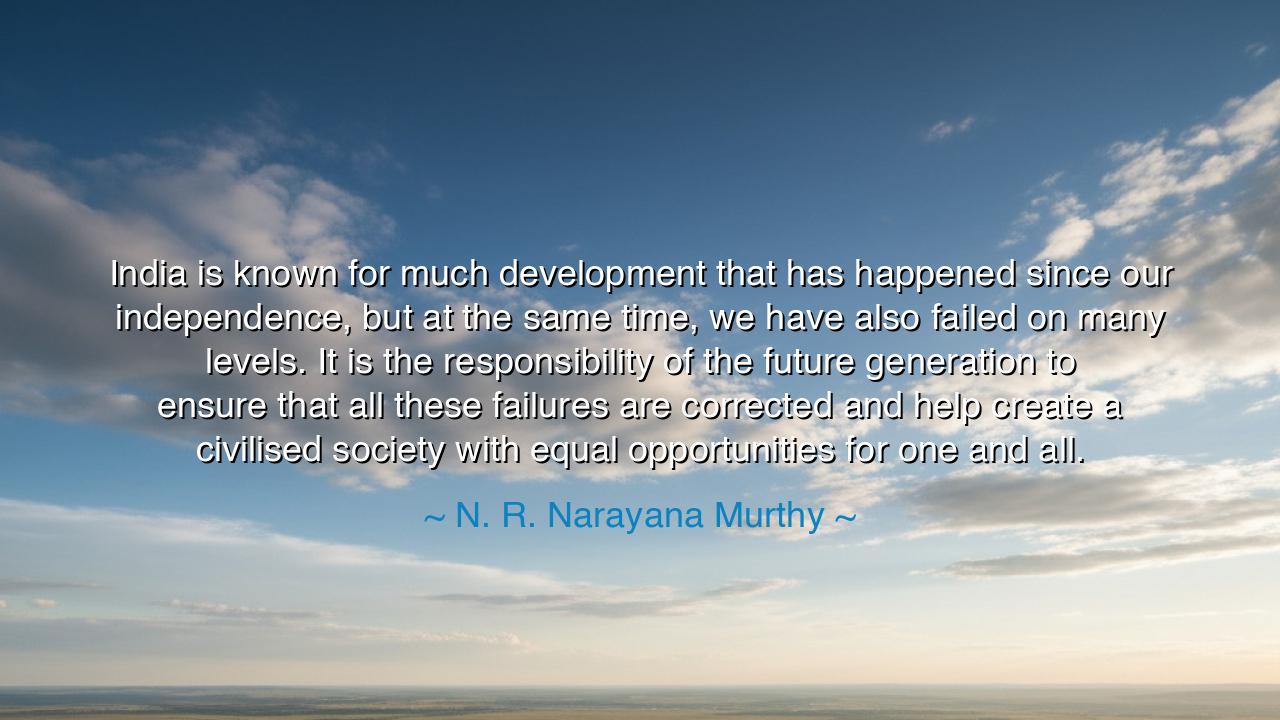
India is known for much development that has happened since our
India is known for much development that has happened since our independence, but at the same time, we have also failed on many levels. It is the responsibility of the future generation to ensure that all these failures are corrected and help create a civilised society with equal opportunities for one and all.






“India is known for much development that has happened since our independence, but at the same time, we have also failed on many levels. It is the responsibility of the future generation to ensure that all these failures are corrected and help create a civilised society with equal opportunities for one and all.” Thus spoke N. R. Narayana Murthy, a visionary and founder of Infosys, whose life has been a testament to integrity, innovation, and service. His words are not merely an observation of a nation’s progress; they are a mirror held before its soul. For in this statement, Murthy captures both the triumph and the tragedy of modern India — a land of immense potential, yet still shadowed by inequality and unfinished dreams. His message is both a celebration of what has been achieved and a summons to those yet to come.
When India gained independence in 1947, it was not merely freed from foreign rule; it was reborn from centuries of subjugation, poverty, and despair. The founding leaders spoke of a new dawn — a nation governed by justice, equality, and hope. And indeed, much has been achieved. India has sent its scientists to the stars, its engineers across the oceans, its entrepreneurs into the heart of the global economy. Villages have turned into cities, and cities into centers of industry and learning. This is the progress Murthy honors — the development that has made India known to the world as a power of intellect and enterprise.
But Murthy, ever the philosopher as much as the technocrat, does not allow pride to blind wisdom. He reminds us that progress without equity is incomplete, and growth without compassion is hollow. In the same breath with which he praises India’s rise, he laments its failures — the deep divisions of wealth and caste, the corruption that corrodes trust, the poverty that still grips millions. He does not speak as a critic from afar, but as one who loves his country deeply enough to tell it the truth. For the wise know that the first duty of patriotism is honesty. To deny the nation’s flaws is not loyalty — it is betrayal.
In his words, Murthy places the burden — and the blessing — of redemption upon the future generation. He calls them to a higher standard than comfort or ambition. The young, he says, must not merely inherit the fruits of freedom; they must repair the roots. It is their responsibility to correct what has gone wrong — to heal divisions, uphold justice, and build a civilised society where equal opportunity is not a slogan, but a reality. The ancients would have called this dharma — the sacred duty to preserve harmony through righteous action. For every generation, says Murthy, is not judged by what it receives, but by what it leaves behind.
History offers its own lessons for such a calling. Consider Emperor Ashoka, who, after years of conquest and bloodshed, turned away from violence and devoted his life to compassion, governance, and reform. He recognized that a nation’s greatness does not lie in the power it wields, but in the justice it upholds. His transformation from conqueror to caretaker mirrors the very ideal Murthy speaks of — the passage from achievement to responsibility. True progress is not measured in monuments or wealth, but in the kindness of society’s laws, the dignity of its people, and the fairness of its opportunities.
Murthy’s message, then, is both moral and practical. He does not call for blind revolution, but for reformation — the slow, deliberate building of a society that embodies the values it professes. He believes in the power of the individual, in education as a tool of liberation, and in integrity as the cornerstone of leadership. To the young, he offers not comfort, but challenge: to be the generation that finishes what independence began, to rise above cynicism, and to create a nation where development is matched by decency, and prosperity by compassion.
So let this teaching be carried forward: that freedom is not a gift that ends with one generation; it is a flame that must be kept alive through each. A nation’s destiny is not written by its founders alone, but rewritten by those who come after, through their courage, their choices, and their care. Let every student, every worker, every dreamer remember Murthy’s words — that to build a civilised society is not the work of the powerful few, but the duty of all.
And thus, my child, when you speak of independence, do not speak only of flags or anniversaries. Speak of justice. Speak of opportunity. Speak of your responsibility to correct what remains broken. For a nation becomes truly free not when it breaks its chains, but when it lifts all its people to stand as equals beneath the same sky. This, then, is the legacy Murthy entrusts to you — the sacred work of the future generation, the builders of the India yet to come.






AAdministratorAdministrator
Welcome, honored guests. Please leave a comment, we will respond soon